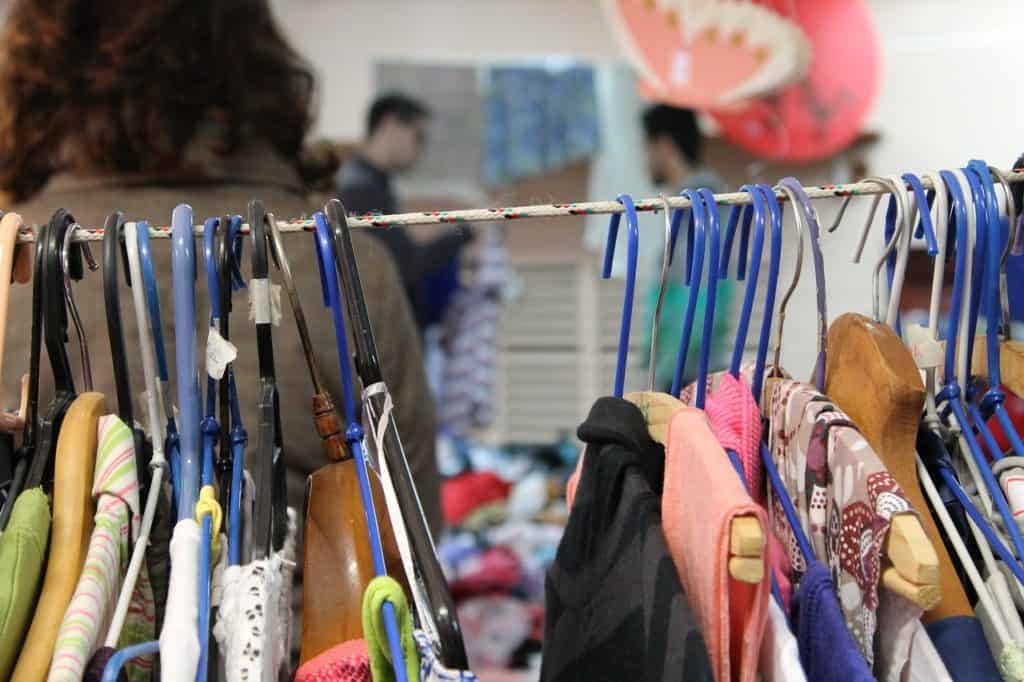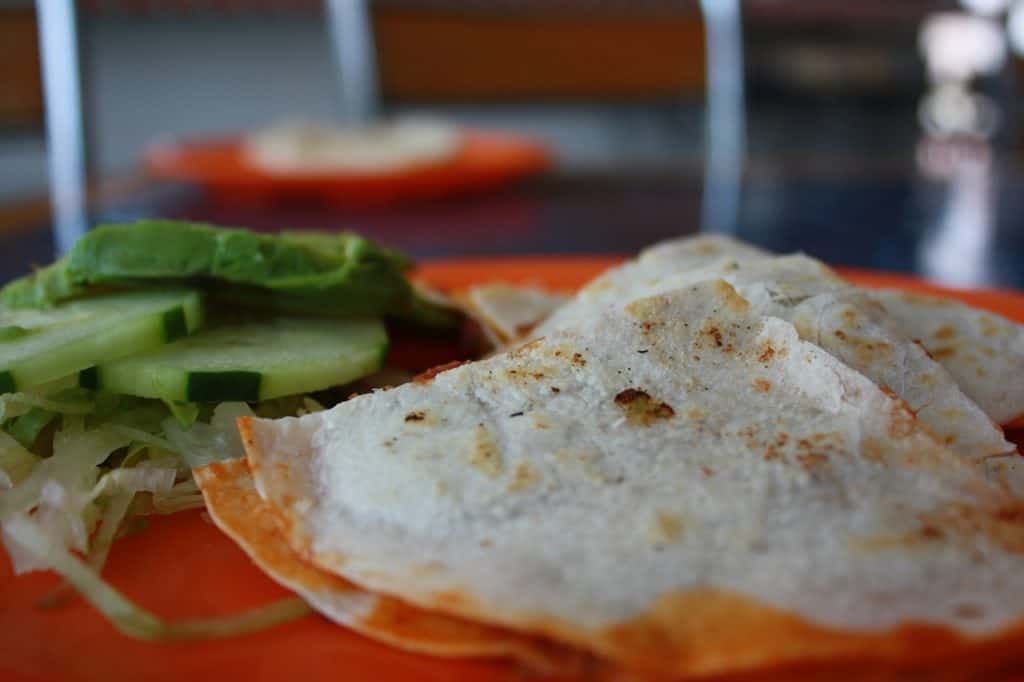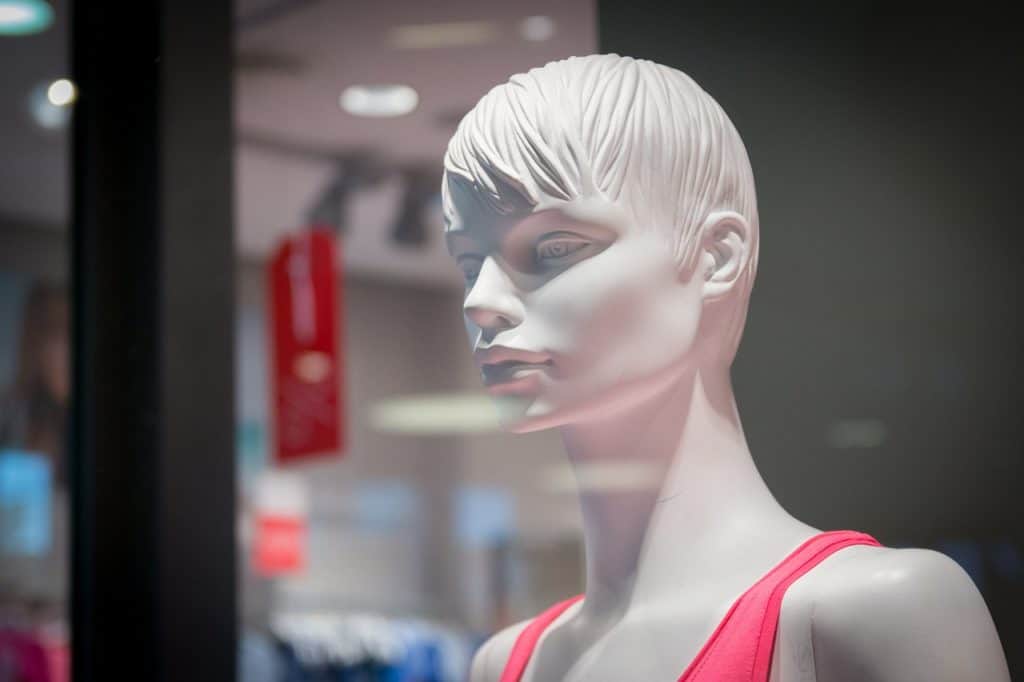Fight in the Goodwill
– Fierce Fiction by Lane Mullin – January 17, 2019

The window display in the Goodwill relied on an imaginative employee. Sometimes washed, occasionally smokey, and always imperfect garments from the widows, wealthy, and wanderers were transformed into an inviting mannequin masquerade. The lifeless torsos and faceless busts were tasked to evoke memories of recent decades past, taking one woman’s trash for the purpose of sparking the nostalgia in the pedestrian. These displays were often a non-profit seasonal indicator of holidays approaching, or those that had occurred a month prior. The same windows that featured construction paper hearts and outerwear in February were to shift to summer dresses and patriotic colors in July. Back to school sales featuring children’s clothes gave way to kitsch DIY costumes in October. This all preceded window frosting, garlands, and a plastic tree (available for sale) before it returned to the Valentine season.
Cal attempted to hide his struggle to carry a large box of personal effects, two paper bags of books, and a large plastic bag full of clothes. He was the common cartoon of a man determined to bring in all the groceries in one trip; red and white lines encircled a fatigued digit and the familiar numbness of anaerobic appendages screamed internally for relief. Cal collected himself, best he could, as he pushed passed the glass door decorated with silhouettes of cherubs armed with bows and well wishes and red lips full of kisses. Cal knew he had to steady himself and not look too desperate as he crossed the terminator of contemporary anthropology. Once Cal was turned away because his local Goodwill was “full.” He suspected later that it was because he appeared to be dumping trash; this was something employees were wary about and on their guard for. He had learned never to come an hour within closing and never the same Goodwill twice in one week. Still, these trips had become too frequent, for even this location’s employees knew Cal by sight.
“Bring it to the back,” called the cashier. “You don’t have anymore furniture?” He added and grinned widely.
“No.” Cal winced as he took deliberate steps to the back of the store near the bathroom and loading bay.
Last time Cal came he brought with him an end table that he couldn’t stomach looking at anymore. It had a square top and was full of sharp wooden angles. It was a beautiful enough piece, but Cal had no use for it and needed to “let go” and “make new spaces.” As the antique legs softly landed on the showcase floor, two men who had been arguing over who would claim the tax receipt were suddenly navigating their way around a weathered wicker cabinet with broken lattice and a piece of a sectional couch. The two patiently waited for the donor to step away from his treasure and attempted not to look too interested in whatever happenstance led to the jetsam’s arrival to the shores of Goodwill Island.
“It’s a Wormley!”
“It’s an Eames!”
They stretched their arms across the flat surfaces as if blind and unable to make out the shape of their object of desire. In hushed voices they continued.
“Remember why we’re here, James. We can’t both have this and you know I studied mid-century design. This belongs -”
“You’ll be possessive ‘til the end! Even now you can’t stop yourself from controlling this moment, our last. When you are alone this weekend and watching the Warriors alone, you remember why we were here, Dale. You remember.”
Cal turned around, everyone turned around, to see Dale lift and pull the wooden table away from the grasp of James.
“I would like to purchase this piece now,” Dale announced to the Goodwill as he stepped carefully towards the register. Unabated by Dale’s power play, James lunged forward, grabbed hold of the legs, and pulled hard. Dale almost lost his grip, but found a new hold on the lip of the table top. Both secured their side of the piece while attempting to find stable footing among the detritus. They accused each other of making a scene while pulling on the sturdy construction. This went on for a few moments and only paused when the lone drawer began to slide. It was saved by a brief truce that rotated the table. The two men continued their contest for the furniture and could no longer contain their voices. Yelling began and did not end until one man said a single word.
“Fine!”
And with that, one man’s grip was loosed and the other stumbled back uncontrollably. Dale, or was it James, took one, two, three, four teetering steps with the table held above his head before crashing into the home appliances shelving with a loud clatter. Waffle irons, juicers, lamps, and handheld vacuums were strewn across the floor.
The fallen man groaned.
“Bunny!” cried out the still standing lover. He rushed to his partner.
More groaning escaped the motionless man who had managed to keep the table above the fray.
“I think I thipped a tooth.” His face was puffy and there was blood in his mouth.
“I’m gonna take you to Dentist Hildebrand right away.”
“I’m thorry, I’m thorry.”
“No, I’m sorry.”
The unhurt man put the table behind the register and helped his counterpart up and out the door, apologizing to anyone within earshot about everything and noted that they would be back for the table. Cal envied Dale and James.
That was last week and Cal did not anticipate anything like that happening again. The cashier made eye contact with Cal and placed a familiar yellow tax receipt on the counter, “When you’re ready.”
Cal had heard a lot of that these last few months. “When you’re ready.” It was a weak salve that was used by all: family members, friends, employers. Cal took a shameful and guilty peace in having some time on his hands. He was an interloper in the lives of homeschool families, contractors, affluent spouses, retirees, and the terminally unemployable. He couldn’t remember having this amount of time alone. Without direction, Cal listed through the waves of racks in the men’s section.
Cal spotted a dark blue coat with enlisted stripes on the sleeve. He was always surprised when he saw uniforms of any description in Goodwill. Uniforms seemed like a sacred thing to be kept in a closet or an attic, where sacred things ought to be. Cal remembered his military brat days on base. Everyone’s dad wore a uniform. It wasn’t until after his father retired that he knew how different the civilian world was.
His hands parted the hangers on the rack to make out what ribbons or medals might have remained. But, alas, he stared upon a language he had forgotten or never really knew. The multi-colored rectangles were indecipherable to Cal and he speculated what the authors would say if they saw their proclamations abandoned somewhere between a twill jacket patched with band insignias and a community college hoodie on rack number four. Was there no caring kin to keep this? Was this a career soldier with no family? Was this an absentee father? Was, Cal checked the name on the coat, Arroyo’s death sudden and anonymous? How could this jacket mean so little and be remembered by no one? Also, who is in the market for Sargent Arroyo’s military dress? Cal shivered at the thought of this artefact being repurposed as a sloppy Village People costume. He slid the hangers in quick succession to direct his attention to something else; he had enough to think about already. There was no need for this to make him unhappy.
Eventually, another jacket slid into view on the rack. It was red with large snapping metal buttons and white banding around the wrists and waist. The wool was clean and a pale felt “C” was matted perfectly on the left breast. Cal thought it might be monogrammed for him; it was his size. He pulled it off the hanger and pressed it against his chest to eyeball the length. He rotated in place, looking for a body length mirror. As he approached his reflection he realized he hadn’t seen himself in a while. There was more skin under his chin than he had last remembered and he had forgotten to brush his hair. There was also some red and white around his mouth that could have been spaghetti sauce and toothpaste. He rubbed his stubbled face into his crew neck collar and quickly glanced around the room to see who may have judged his dirty grunge face. Without an obvious audience, Cal quickly brushed his hair with his fingers, settling on a part down the middle. He looked like the fourth Hanson brother no one knew. Whatever. He adorned the letterman jacket. While it did fit, like the arms didn’t have trouble going in or anything, it didn’t have any extra room. It was a tightish fit. Cal knew he hadn’t been eating right and he could drop fifteen pounds if he wanted. He’ll start cooking again, soon. His eyes appraised the jacket for a few moments before shifting their gaze upwards. Cal stared into his own pupils and his mortal brain saw itself and questioned how it had arrived there.
College years flashed into his mind. He was taken by the least significant memory. Cal was walking to campus on Broadway Street and was just passing Tres Amigos. The restaurant had burned down and rebuilt with a beautiful patio that extended the sidewalk. He strode by two women who were wearing seasonally appropriate attire; it was late into the spring semester and girls were wearing sundresses and athletic wear that Cal forced himself not to stare at. In that moment their star jasmine perfume was cut by the marinade sizzling off a plate of fajitas. The aromas of attraction and sustenance pulled at Cal’s base instincts and he wondered why anyone would go to class on a day like this.
 Continuing on he looked at the plates as if to remember a dish to order later. Maybe he would say, “I’ll have what they’re having,” and point to a plate of chicken enchiladas, fish tacos, or a fishbowl margarita. Only his overcharged debit account and a notion of sanity kept him from exclaiming then and there. He looked towards the patrons and saw that the crowd was older than usual. What’s more, there were families with kids about. A father in a Hawaiian shirt was giving advice and motioned with interlaced fingers as if he was making a giving gesture. The child mimicked his dad and was rewarded with a paternal tousling of hair. The father saw Cal observe the moment and gave a friendly wave. It was a wave the locals gave students that said, “goodbye now.”
Continuing on he looked at the plates as if to remember a dish to order later. Maybe he would say, “I’ll have what they’re having,” and point to a plate of chicken enchiladas, fish tacos, or a fishbowl margarita. Only his overcharged debit account and a notion of sanity kept him from exclaiming then and there. He looked towards the patrons and saw that the crowd was older than usual. What’s more, there were families with kids about. A father in a Hawaiian shirt was giving advice and motioned with interlaced fingers as if he was making a giving gesture. The child mimicked his dad and was rewarded with a paternal tousling of hair. The father saw Cal observe the moment and gave a friendly wave. It was a wave the locals gave students that said, “goodbye now.”
The hold the locals have over a college town seems barely salient when you are a student, but undeniable when you are a graduate. There is a silent solace, a quiet victory in knowing that they will outlast your tuition. They will always own the summer and winter months at the parks, bars, malls, and markets. Your existence is just an instance in a larger migration pattern that only they witness.
Even when Cal went back now, he was conscious of the fact that he was an alum in someone else’s college years. Some of the cafes had changed names or closed down. Some construction on campus had eaten away at the “free speech” lawn. Some of the indelible professors no longer had their names listed on the department pages online. The presumption of ownership and permanence was fleeting and never really Cal’s to begin with. But he could afford the fajitas now.
“You alright?” A black woman put her hand on Cal’s back. “You look like you need an oil can or some straw,” she teased. Cal came back to the world and apologized.
“You’re good, I just need to see myself in these pants.”
Cal apologized again, rehung the jacket, and walked to the front counter. There were more people here than he had remembered. His tax receipt was still waiting there for him, but a line had formed. He took the yellow paper, a pen from a Mickey Mouse cup, and found a clear spot on the counter a few feet away.
What did he donate today? The box was mostly office supplies. They were duplicates or triplicates from when they had moved in together. Sure, two staplers were handy, but three were excessive. Cal had also consolidated some scrapbooking projects that were under the bed and dumped old college work; he found seven binders he couldn’t justify keeping. Scissors, like can openers, just seemed to accumulate. He found he had two extra of each and threw them in the box. There were four picture frames, three vases, two tape dispensers, and an unopened shower curtain that was a gift from someone’s mom. There was also a fitted sheet for a bed they never had. An old desk lamp that used obsolete bulbs and a whiteboard/corkboard wall unit were stuffed in the box as well. Cal tried some Price is Right math to guess what deduction he could claim and not be audited.
Cal speculated on how long you would have to be married to claim an exemption. Is that how that works? Would we have filed together? What tax bracket would he be in this year? He would likely be bracketed between the allusive and opaque low middle class and unlucky bachelor. Cal was released from the financial burden of family pets, children, and mortgages. A move was imminent though. The lease ended in three months. The landlord was understanding, but this was the Bay.
Then there were the books. It had taken time to realize that most books were not worth rereading. And even if they were, they were never going to make the tight budget of Cal’s time. There were too many podcasts and video games to make room for a philosophy book from freshman year or a remedial math textbook. No one needs three anthologies that all list Shirley Jackson’s “Lottery.” It’s a good story, but you only need one copy of it. Cal added another number more ridiculous than his office supply figure. Any estimation above the price of a sandwich would be a lie, but who was going to call him on this? Cal put down a double digit number and continued down the list.
Clothes. He didn’t want to think about it. Samantha’s mother and sister were invited to take whatever they wanted and he would bag up the rest for trips like today. Cal couldn’t be home when they did it; he didn’t care what they found in the sock drawers; nothing private was worth preserving anymore. He left the apartment when they arrived and went about his routine. He had already cried in the bed and bathroom; now it was time to drive to the beach. The monotony of the waves and the size of the ocean were calming if not distracting. There was also a desire not to break down in public. It was a sort of self censorship or shaming that could be labelled as repression by someone else. Cal returned that afternoon to seven trash bags full of clothes and a bowl of fruit. He found a note on the TV, “There is a frozen pizza in the oven and beer in the fridge. We’re here for you.” Cal cried again.
How do you estimate a woman’s wardrobe? This bag was mostly sleep shirts from volunteer activities and team building exercises. In addition, there were a handful of well made basics and some tunic tops that must not of fit Sam’s sister. Samantha’s scent had washed out of the cotton and, for the most part, this was not the hardest donation run this week. Cal tried to make a rule of only keeping things that she handed to him, things that she used often, or things that reminded him of their best moments. It wasn’t a hard and fast rule, or a useful rule, but it did help sort things in the beginning. Cal wrote down a number somewhere between the book and office supply estimates. Still, he wondered if he had forgotten something.
Cal watched the line progress and saw the recycling of the treasures and trash hidden in the Painted Ladies, downtown condos, and single family homes housing three generations. The procession of thrifters carried their finds before them like Catholics queing for the Eucharist. No one talked to one another and everyone prepared for their moment before the cashier.
“Eight dollars.”
“Okay.”
“Your receipt.”
They carried Coca Cola glasses, Hall and Oates records, twenty pound dumbbells and Time magazines. Cal considered the collections that these misfits fell from. Someone must have thought they were going to own these possessions forever, but what belongs to anyone is just rented. It is such a painful process of leaving the dead over and over again as you liquidate their horde. Maybe the biggest service anyone does is tidying up before they go.
Cal strained his memory trying to think of anything he could have forgotten. The doldrums of his mind were blown away by one woman’s discovery.
“Hummel”
That was it. Samantha had a porcelain boy petting a dog. It was only a few inches tall and while it might have been worth something, it wasn’t worth the time required to negotiate and hock. Cal wrote another generous estimate on his tax receipt and grabbed a cashier’s signature between purchases.
A woman with a green scarf declared, “That was in my stack.”
 “No stack. You were over there,” replied another woman in a knitted white cap who pointed to the adjacent aisle of homegoods.
“No stack. You were over there,” replied another woman in a knitted white cap who pointed to the adjacent aisle of homegoods.
Green Scarf repeatedly instructed White Cap to, “Give it here,” which White Cap consistently denied with a quiet “no.” White Cap shuffled ever closer to the cashier with each rebuke. This continued until White Cap dashed for the door.
“That’s not right.” Green Scarf affirmed and ran out to meet her.
Cal could make out though the window display the two women fighting for possession of the small sculpture. Their locked arms pulled each other in a slow circle under the cupid cutouts and red and white streamers. The mannequins looked on, unaware of the struggle before them. Their aggressive dance broke when the ceramic boy slammed into a parking meter dislodging his head, sending it rolling a few yards down the sidewalk.
Cal decided it was time to make his escape. He took his receipt and walked away from the women diving for the smiling face.
 About the Author – Lane Mullin
About the Author – Lane Mullin
Lane Mullin is a teacher in Half Moon Bay, California. When he is not teaching freshman English and ELD classes, he makes time for writing whenever possible. He sponsors the Creative Writing Club at his high school and shepherds the publication of their annual literary anthology, The Muse. He also plays bass in the staff band. Lane graduated from California State University, Chico with a degree in English Education in 2010.
–
–
Did you like “Fight in the Goodwill”‘ by Lane Mullin? Then you might also like:
The Window
Target Practice
What I Remember from 5th & San Pedro
Just a Half-Teaspoon